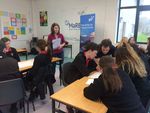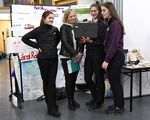CLIMATE HACK CONNOR MCGOOKIN, MAREI CENTRE & DEIRDRE DE BHAILÍS, DINGLE CREATIVITY AND INNOVATION HUB - DINGLE PENINSULA 2030
←
→
Page content transcription
If your browser does not render page correctly, please read the page content below
Climate Hack Connor McGookin, MaREI Centre & Deirdre de Bhailís, Dingle Creativity and Innovation Hub
Background
The format of the event is based on the ‘serious well as information sheets on the options available
game’ approach to scientific communication. A to decarbonise heating, electricity and transport
serious game is an interactive approach that is were prepared. The purpose of providing this
designed with the intention to teach rather than information was firstly to highlight the challenges
purely entertain. It is a very commonly used facing the Dingle Peninsula and secondly to
method of engagement in climate change ensure that the students could make well-informed
research. [1] [2] [3] These games can help raise decisions about the future of their energy system.
awareness, build capacity for problem solving and
provide a space to explore potential futures. [4] A This was an interactive outreach event to highlight
well-known example of the serious game the ongoing work of the Dingle Peninsula 2030
approach is the World Climate Simulation, which stakeholder group.[9] Dingle Peninsula 2030 is the
asks participants to take on the role of UN umbrella title for the partnership formed between
negotiators and agree global climate change the Dingle Creativity and Innovation Hub, ESB
policy. [5] Networks, MaREI and NEWKD. The ambition of
the group is to support and enable the Dingle
The idea of the ‘climate hack’ template developed Peninsula transition to a low carbon future and to
for the Dingle Peninsula was inspired by the work showcase the benefits achievable for rural Ireland
of Krzywoszynska et al. [6],Thomas et al. [7] and in the process. The ‘climate hack’ was an important
Volken et al. [8]. These studies all used some form opportunity to highlight to young people the ongo-
of information sheets/cards to help participants ing work to develop an energy master plan for the
make informed decisions about the future energy area as well as a number of exciting initiatives
system. A similar approach was applied with the around; transport, bioenergy,
‘climate hack’, an introductory brief on the current co-operative ownership structures and sustainable
energy usage and associated CO2 emissions, as farming.
Aims and Objectives
The overall aim of the event was to capture the key concerns of young people in the area. By giving
them usable information and asking them to assume the role of a town planner, an interesting insight
was gained into what parts of the energy transition they viewed as most important and their perceptions
of the various solutions available.
The key objectives may be summarised as follows:
Inform students of the current energy usage in their area, highlighting large sources of energy demand such as
private car travel or home heating.
Give students the necessary data on electricity, heating and transport energy options so they can
make informed decisions about the future of their energy system.
Capture the opinions and perspectives of young people.
Develop local energy projects guided by young people’s vision for a more sustainable future.
It was decided that the event would not be run as a competition but rather that following the event the
most enthusiastic group from each school would be asked to develop their idea further and prepare a
poster presentation to display at the public launch of the Dingle Peninsula Energy Master Plan. In the
end, the best idea from each challenge was chosen, giving a presentation on a community solar farm,
public transport and alternative sources of heat (anaerobic digestion and hydrogen from electrolysis).
Climate HackHow It Worked
The event was run as part of Science Week 2019 in
collaboration with the Dingle Creativity and Innovation
Hub. It involved a two-hour workshop with fourth and
fifth year students in the three secondary schools on
the Dingle Peninsula; Pobalscoil Chorca Dhuibhne,
Coláiste Íde and Meanscoil Nua an Leith-Triúigh. The Preparation
material used during the event can be found at
www.marei.ie/dingle-peninsula-2030/, and below is a One week prior to the event, the introductory
summary of the resources needed. In addition, there brief was sent out to schools. This gave an
overview of how energy was currently being
is a short-film of the event available on the Dingle
consumed in the region, how much this was
Creativity and Innovation Hub’s YouTube channel. [10] costing the average household and the
associated CO2 emissions. It then prompted
Inputs the students to investigate three key
challenges facing the area; private car travel,
Person-hours home heating and electricity supply. In groups,
Preparation* 24 the students were asked to choose one of
these challenges or propose their own. A
Event 18 number of useful links were provided so that
Total 42 students could conduct their own piece of
research in preparation for the event.
Cost
Translation ** €150
Printing & Co-ordination €250 The Event
Video €1,100
Travel & Accommodation €160 The event was run for 2 hours:
Total €1,660
5 mins - Initial welcome address from Dingle
*Preparation of the material and event organisation, excludes preparation time of the teachers / students Creativity and Innovation Hub.
**Corca Dhuibhne is a Gaeltacht region, so all material was bilingual
10 mins – Introductory presentation from
The information on energy usage and alternative
MaREI on the Dingle Peninsula energy balance
options for heating, transport and electricity was and low carbon solutions in heating, transport
primary based on the work of McGookin et al. [11], and electricity.
which also formed the basis of the Dingle Peninsula
Energy Master Plan. [12]
1 hr 15 mins – Students were given the
information sheet for their chosen challenge as
well as an answer template with four sections
to fill-in; CO2 savings, cost estimate, potential
barriers and benefits of their proposal. The data
needed and example calculations were provided
on the information sheet. In addition, tablet
computers were available for further research.
30 mins – Each group was asked to present
their idea(s).
Climate HackLessons Learnt
Preparation is important – if students are given time to form groups and decide what they want to work
on before the event then they get a lot more out of it.
Demonstrator ratio - In order to ensure the students are given adequate attention and maintain focus
throughout the exercise, it is best to have at least one demonstrator for every three groups of students.
Not everyone is an engineer - The calculations should be simple, with easy to follow instructions.
It is only necessary to give an overview of the relative cost of solutions in order to prompt a discussion
about trade-offs like the fact that micro (domestic-scale) wind energy might be more popular but is not
as cost effective as large (commercial-scale) projects.
Focus on creativity - The solutions sheets should focus on developing an idea rather than calculating
CO2 savings or a cost estimate. The most important element of the event is to give young people an
opportunity to make suggestions.
Outcomes
The students presented their proposals as part of the Dingle
Peninsula 2030 event on Feb 13th 2020, with an attendance
of roughly 300 people.
A group of students from Meanscoil Nua an Leith-Triúigh,
Castlegregory applied to the Friends of the Earth Solar PV
competition.
A Junior Cert Maths student used the template to develop an
energy overview for their county as part of their CBA. Inte-
grating the exercise into existing coursework presents an
excellent opportunity to engage young people in climate
change discussions.
MaREI is working on refining the event material with a view
to creating a national template.
References
1. Flood, S., et al., Adaptive and interactive climate futures: Systematic review of
‘serious games’ for engagement and decision-making. Environmental Research
Letters, 2018.13(6):p.063005. 8. Volken, S.P., G. Xexakis, and E. Trutnevyte, Perspectives of informed citizen
panel on low-carbon electricity portfolios in Switzerland and longer-term
2. Crookall, D., Climate change and simulation/gaming: Learning for survival. evaluation of informational materials. Environmental science & technology, 2018.
2013, SAGE Publications Sage CA: Los Angeles, CA. 52(20): p. 11478-11489.
3. Reckien, D. and K. Eisenack, Climate change gaming on board and screen: A 9. Dingle Creativitty and Innovation Hub (Molteic). Dingle Peninsula 2030. 2020;
review. Simulation & Gaming, 2013.44(2-3): p. 253-271. Available from: https://dinglepeninsula2030.com/.
4. Eisenack, K. and D. Reckien, Climate change and simulation/gaming. 2013, 10. Dingle Creativitty and Innovation Hub (Molteic). Climate Hack - Dingle
SAGE Publications Sage CA: Los Angeles, CA. Peninsula 2019/ Seift Aeráide - Corca Dhuibhne 2019. Available from: https://ww-
w.youtube.com/watch?v=8SM80eQAL3o.
5. Climate Interactive. Wolrd Climate Simulation. Available from: https://www.cli-
mateinteractive.org/tools/world-climate-simulation/. 11. McGookin, C., B.Ó. Gallachóir, and E. Byrne. A multi-dimensional approach for
the development of a regional energy balance. 2020; Available from: https://co-
6. Krzywoszynska, A., et al., Co-producing energy futures: impacts of participa- ra.ucc.ie/.
tory modelling. Building Research and Information, 2016. 44(7): p. 804-815.
12. McGookin, C. Dingle Peninsula Energy Master Plan. 2020; Available from:
7. Thomas, M., et al., Using role play to explore energy perceptions in the United https://dinglepeninsula2030.com/projects/energy/energy-master-plan/.
States and United Kingdom. Energy Research & Social Science, 2018. 45: p.
363-373.
This work was co-funded by MaREI, the SFI Centre for Energy, Climate and Marine, the Dingle Creativity and Innovation Hub (Mol Teic) and ESB Networks.
Climate HackYou can also read
























































